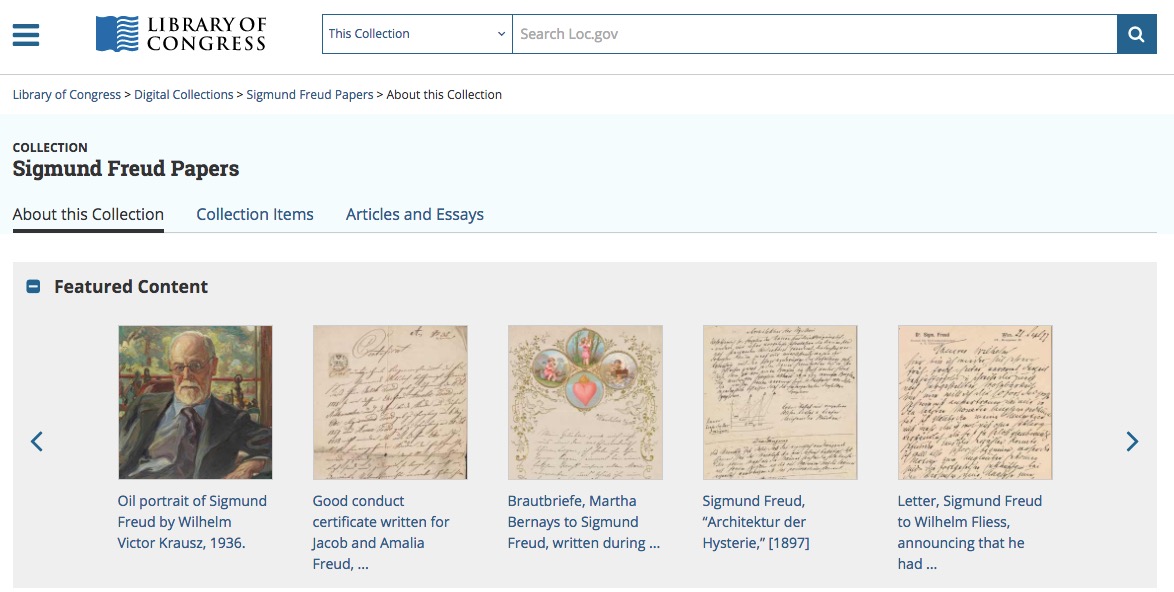Library of Congress Digitizes Sigmund Freud Collection, Over 20,000 Items Now Available Online
From LC:
The Sigmund Freud Collection at the Library of Congress has been digitized and is now online.
The online collection, with more than 20,000 items, contains the personal papers of Sigmund Freud (1856-1939), the neurologist and founder of psychoanalysis whose ideas of the unconscious and theories on sex, repression, transference and religion profoundly influenced 20th-century Western thought. His theories still generate controversy.
The digitization of Freud’s papers has been made possible by a generous grant from The Polonsky Foundation, a UK-registered charity, which primarily supports cultural heritage, scholarship in the humanities and social sciences, and innovation in higher education and the arts. It
[Clip]
“We are delighted to support the Library of Congress in the important project of making Freud’s legacy more widely available, both to researchers and the broader public,” said Dr. Leonard Polonsky CBE (Commander of the Most Excellent Order of the British Empire).
Seventy-eight years after his death, Freud, who escaped to London after the Nazi takeover of Austria prior to World War II, remains a primary figure in modern cultural and intellectual history. The collection documents the formulation of Freud’s thinking, including the birth and maturation of psychoanalytic theory, the refinement of its clinical technique and the proliferation of its adherents and critics.
Freud’s papers at the Library are part of a larger body of materials relating to psychoanalysis and the Freudian movement donated, beginning in 1952, by the Sigmund Freud Archives. A private organization of analysts in New York, the Sigmund Freud Archives was created to collect and preserve for scholarship the work of Freud and others in the field of psychoanalysis. Additional items were obtained through purchase, transfer, and gift or bequest of others, including Freud’s daughter, Anna Freud.
The collection reveals Freud’s life and work, including his early medical and clinical training; his relationship with family, friends, colleagues, students, and patients; his association with early psychoanalytic societies; his perspectives on analytical training; and his numerous writings. It contains family papers, correspondence, writings, legal documents and certificates, notebooks, and other materials of a personal nature encompassing his life and career. People of great prominence in 20th-century history are among the correspondents: Franz Werfel, Theodor Hertzl, Stefan Zweig, C.G. Jung, Thomas Mann, Albert Einstein, Havelock Ellis and Romain Rolland.
Most of the handwriting is in the so-called Gothic or Sütterlin script used by writers of German at the time. Interspersed with mostly original items are photocopies, facsimiles, transcripts, and English translations of some of the material. Also included are more than 300 interviews with Freud associates, patients and family members after his death conducted by K.R. Eissler, a director and founder of the Sigmund Freud Archives.
Direct to Sigmund Freud Collection (via Library of Congress)
See Also: Sigmund Freud Collection Finding Aid
See Also: Exhibition – Sigmund Freud: Conflict and Culture
Read the Complete Online Collection Launch Announcement
Filed under: Archives and Special Collections, Digital Collections, Digital Preservation, Funding, Interactive Tools, Interviews, Journal Articles, Libraries, News
About Gary Price
Gary Price (gprice@gmail.com) is a librarian, writer, consultant, and frequent conference speaker based in the Washington D.C. metro area. He earned his MLIS degree from Wayne State University in Detroit. Price has won several awards including the SLA Innovations in Technology Award and Alumnus of the Year from the Wayne St. University Library and Information Science Program. From 2006-2009 he was Director of Online Information Services at Ask.com.



